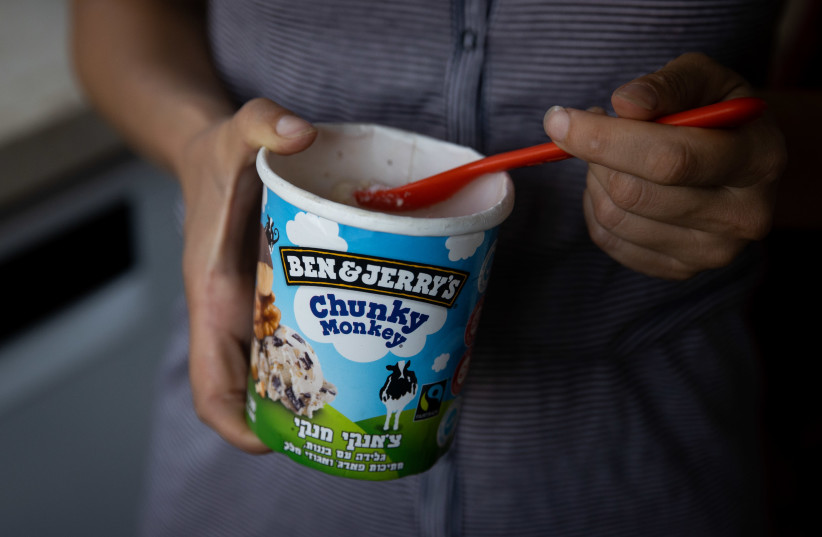Ben & Jerry’s boycott of Israel is still intact even though the local company can continue to produce ice cream under an amended brand name, the Vermont-based creamery clarified on Twitter.
“Our company will no longer profit from Ben & Jerry’s in Israel,” Ben & Jerry’s said in a statement after an agreement was announced on Wednesday that ended a year-long battle by businessmen Avi Zinger.
Under an agreement reached as the result of a lawsuit Zinger filed in New Jersey Federal Court together with the Louise B. Brandeis Center for Human Rights Under Law, he is allowed to continue making the ice cream under his company, American Quality Products.
Zinger can continue to make the same Ben & Jerry’s ice cream the Israeli consumers have come to know, but he cannot do so under Ben & Jerry’s English-language brand name. He can only use the name Ben & Jerry’s in Hebrew and Arabic.

His company will also now be independent from Ben & Jerry’s and its parent company the London-based conglomerate Unilever. The agreement was reached between Unilever and Zinger.
Ben & Jerry's objection
“We are aware of the Unilever announcement. While our parent company has taken this decision, we do not agree with it,” Ben & Jerry’s tweeted.
It underscored that there would now be no connection between its Vermont-based company known for taking social values stands and the Israeli company.
“Unilever’s arrangement means Ben & Jerry’s in Israel will be owned and operated by AQP,” Ben & Jerry’s said, referencing Zinger’s company.
“We continue to believe it is inconsistent with Ben & Jerry’s values for our ice cream to be sold in the Occupied Palestinian Territory,” Ben & Jerry’s tweeted.
Zinger opened the first and only Ben & Jerry’s franchise in Israel over 34 years ago. Zinger’s franchise is located within the country’s sovereign borders in southern Israel.
Ben & Jerry’s pressured him the past decade to halt any sales of their products to Israeli-held areas over the pre-1967 lines, such as West Bank settlements.
Zinger’s refusal eventually caused Ben & Jerry’s Board to declare that it would terminate his contract. The decision created a problem for Ben & Jerry’s parent company Unilever, given that it is also part owner of a competitive ice cream company Strauss, on whom no such sales limits were placed.
But based on the agreement, Unilever’s ties with Zinger were also severed.
“Unilever has sold its Ben & Jerry’s business interests in Israel to Zinger to enable him to continue selling the same Ben & Jerry’s ice cream consumers have been enjoying for 35 years with its Hebrew and Arabic name,” the Brandeis Center explained.
Unilever in making the same announcement underscored that it was proud that its other products were sold in Israel and that it rejected the Boycott Sanctions and Divestment movement.
“Unilever rejects completely and repudiates unequivocally any form of discrimination or intolerance. Antisemitism has no place in any society. We have never expressed any support for the Boycott Divestment Sanctions (BDS) movement and have no intention of changing that position,” Unilever said.
The state of Israel and the Brandeis Center, as well as Zinger, hailed the agreement as a victory. Others noted that Ben & Jerry’s anti-Israel stance had remained intact.
